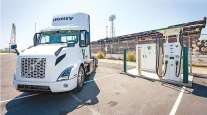Staff Reporter
ACT Panel: Hydrogen Fuel Cells Face Off With All-Electric Batteries

LONG BEACH, Calif. — Many transportation executives see a role for electric trucks in the years to come, but the question of which power-delivery method will move to the forefront — pure-electric or hydrogen fuel-cell electric — remains open, experts said here.
“We are on the cusp of the transformation of truck power,” said Paul Rosa, senior vice president of procurement and fleet planning for Penske Truck Leasing, during a session on alternative fuels held at last month’s ACT Expo. “I can’t tell you how excited I am for the state of the transportation industry.” Rosa joined executives from Volvo Trucks and Nikola Motor on the April 24 panel — the same day his company announced the deployment of four battery-charging stations in Southern California. But he noted that the entire industry is still finding its way with electric power. “I would call it ‘Operation Learn,’” he said. “There is so much more to learn. We have to be patient. This technology has to evolve. There is so much that has to come online for this to work.”

Penske Logistics ranks No. 19 on the Transport Topics Top 100 list of the largest for-hire carriers in North America, and the company is No. 8 on the Transport Topics Top 50 list of the largest logistics companies in North America.
While Nikola offers both pure-electric and fuel-cell electric versions of its Class 8 trucks, CEO Trevor Milton believes the tide will shift toward the latter.
“We know battery math about as good as anyone in the world,” he said. “The battery costs have gone up 25% to 30%. They’re not coming down. The more people who jump in, the more expensive it gets.” Milton believes hydrogen fuel-cell trucks make sense for longer hauls, but expects pure-electric to win the market in urban areas.
Regardless of how the market forces play out, Milton said the trucking industry must come to terms with the reality of battery production. He said with Chinese firms working to corner the market on lithium-related resources needed for battery production, the expected rise in costs will turn businesses away. Milton added there are environmental costs to this flurry of mining activity.

Nikola Motor CEO Trevor Milton believes hydrogen fuel-cell trucks make sense for longer hauls, but expects pure-electric to win the market in urban areas. (Jim Stinston/Transport Topics)
“Go look at the emissions they produce to bulldoze an entire city to pull all the minerals out,” he said.
Plus, Milton said that Nikola is focused more on hydrogen fuel cells due to storage capacity and weight savings relative to pure-electric.
His stance contrasted with the vision laid out by Daimler Trucks North America CEO Roger Nielsen, who, during a keynote address at the conference, heartily endorsed pure-electric trucks as the wave of the future; he doesn’t believe hydrogen fuel-cell electric or any other technology will win out.
Volvo Trucks North America president Peter Voorhoeve suggested that the industry may not need to settle on one path forward. “It’s not one silver bullet,” he said, adding that the future will likely hold a “smorgasbord of solutions.”
Voorhoeve added, “All these things will co-exist, depending on the application and depending on the infrastructure possible.”




